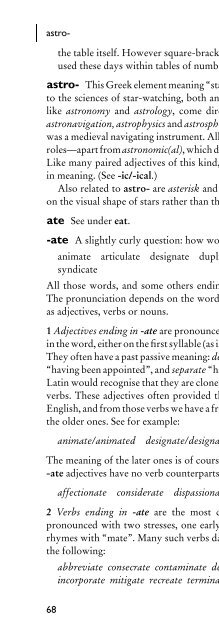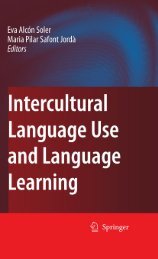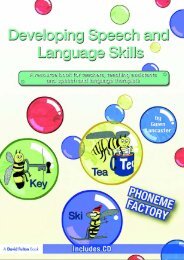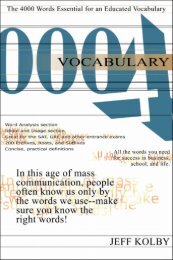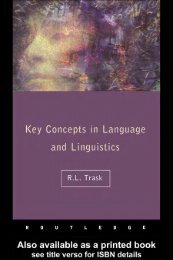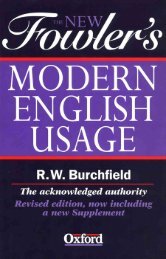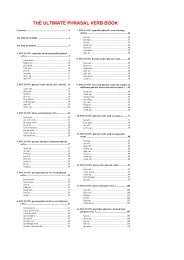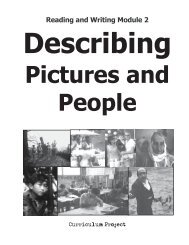- Page 2:
This page intentionally left blank
- Page 8:
The Cambridge Guide to Australian E
- Page 12:
Contents Preface to The Cambridge G
- Page 20:
Preface to The Cambridge Australian
- Page 24:
Preface to the First Edition option
- Page 30:
Foreword to the First Edition The
- Page 34:
Overview of Contents and How to Acc
- Page 40:
A @ The “at sign” is a new recr
- Page 44:
As the list shows, the form an- occ
- Page 48:
abbreviations à la carte method co
- Page 52:
abbreviations Option (c). According
- Page 56:
Aboriginal or Aborigine ablative Th
- Page 60:
absolute use—Pintupi or Bindubi
- Page 64:
accommodate English spelling does w
- Page 68:
acronyms acknowledgement or acknowl
- Page 72:
ad lib Webster’s English Usage (1
- Page 76:
adjectives words: see further under
- Page 80:
adjectives 2 Comparison of adjectiv
- Page 84:
adverbs (hedge words/downtoners) fa
- Page 88:
ae/e With -ise spellings prevailing
- Page 92:
-age surviving and remains producti
- Page 96:
aging or ageing (= familiar), and o
- Page 100:
agreement either neither none no-on
- Page 104:
Note that a few collective nouns al
- Page 108:
alias Some of the earliest examples
- Page 112:
alphabets Letter by letter Word by
- Page 116:
aluminium or aluminum and Hyde. For
- Page 120:
America Inevitably perhaps the word
- Page 124: americanisation During the nineteen
- Page 128: preferred by the Australian Oxford
- Page 132: -ance/-ence analogue or analog The
- Page 136: and/or and The word and is the comm
- Page 140: antipodes to refer to the region ar
- Page 144: apostrophe All pairs of antonyms ha
- Page 148: apostrophes they end in an s or not
- Page 152: apposition The “Apostrophe Man”
- Page 156: arch-/archa-/archae-/arche-/archian
- Page 160: armor or armour Argentinean serve a
- Page 164: artifact or artefact The prime func
- Page 168: Asian or Asiatic conservatory depos
- Page 172: asterisk bodies. But life insurance
- Page 178: -ative Verbs in -ate provide a read
- Page 182: audiovisual and electronic media on
- Page 186: auntie or aunty auntie or aunty Bot
- Page 190: Australian Rules concentrates on Au
- Page 194: auxiliary verbs 1 The primary auxil
- Page 198: ayeoray aye or ay These two spellin
- Page 202: ackslash Most of the backformations
- Page 206: alk or baulk A grammarian would not
- Page 210: athos bath or shower for the purpos
- Page 214: eg the question beg the question Th
- Page 218: etter or bettor better or bettor Th
- Page 222: ias bias When bias becomes a verb,
- Page 226:
icentennial or bicentenary In refe
- Page 230:
imonthly international standards (A
- Page 234:
lue blue For the spelling of blu(e)
- Page 238:
Bosnia Herzegovina Day”) or a fig
- Page 242:
ackets b) Square brackets [] are co
- Page 246:
eathalyser or breathalyzer The verb
- Page 250:
oach, breach or breech broach, brea
- Page 254:
us bus Should it be buses, bused an
- Page 258:
y, by-, bye- and bye By/bye also ap
- Page 262:
cabanossi or kabanossi A similar Fr
- Page 266:
caliber or calibre The other word c
- Page 270:
canceled or cancelled American prac
- Page 274:
capital or capitol capital or capit
- Page 278:
capital letters b) Official titles
- Page 282:
capital letters 2 When capitals dis
- Page 286:
capsize type of coffee which was ne
- Page 290:
castor or caster program etc., alth
- Page 294:
cathode or kathode Grammar of Engli
- Page 298:
-ce/-se In words like those, the e
- Page 302:
cement or concrete Yet in the pre-C
- Page 306:
c’est à dire with graduating. Bu
- Page 310:
chamois, chammy or shammy chamois,
- Page 314:
chiasmus In computer programming, c
- Page 318:
chlorophyll or chlorophyl chlorophy
- Page 322:
-ck/-cq strongly associated with a
- Page 326:
clauses 3 In complex sentences the
- Page 330:
clench or clinch Cleft sentences so
- Page 334:
clinch or clench In argumentative w
- Page 338:
codex codex For the plural of this
- Page 342:
coliseum or colosseum coliseum or c
- Page 346:
colloquialisms Collocations differ
- Page 350:
combated or combatted Spain, he ado
- Page 354:
commands 4 The disappearing comma
- Page 358:
common gender that mutual was the o
- Page 362:
complacent or complaisant record ne
- Page 366:
composed (of) or comprise composed
- Page 370:
concensus or consensus active with
- Page 374:
conjunctions and conjuncts The weak
- Page 378:
conjuncts ideas, and to choose conj
- Page 382:
consistence or consistency His argu
- Page 386:
contracontinuance of your salary),
- Page 390:
contralto days often sought, in bus
- Page 394:
corpus delicti two or more division
- Page 398:
could of or could have about the li
- Page 402:
coup de more important point to not
- Page 406:
crematorium crematorium For the plu
- Page 410:
-ctic/-xic Dictionary (1989), in sp
- Page 414:
curb or kerb curb or kerb In Austra
- Page 418:
cyder or cider, cipher or cypher th
- Page 422:
D da, dal and dalla On whether to c
- Page 426:
danse macabre danse macabre This ph
- Page 430:
data Sydney-Hobart yacht race the A
- Page 434:
dating systems as in the 1940s or i
- Page 438:
daughter-in-law pronouns, adjective
- Page 442:
de profundis de profundis See under
- Page 446:
declension of a declarative sentenc
- Page 450:
defective or deficient Deductive ar
- Page 454:
demagogue or demagog Note also the
- Page 458:
deprecate or depreciate deprecate o
- Page 462:
determiners determiners In modern g
- Page 466:
diad and diadic Note that dialogue
- Page 470:
dies irae is used primarily in prop
- Page 474:
dilettante The origin of the second
- Page 478:
dismodality, and person.) Both chan
- Page 482:
discreet or discrete apropos of ...
- Page 486:
dispatch or despatch dispatch or de
- Page 490:
distracted, distrait or distraught
- Page 494:
-dom supported by a bottomless bank
- Page 498:
doubling of final consonant In a tw
- Page 502:
dramaturge or dramaturgist dramatur
- Page 506:
dyad, diad or duad dyad, diad or du
- Page 510:
-e Exceptions and variations to the
- Page 514:
each is when the root word has only
- Page 518:
echidna plural form current. But ma
- Page 522:
edema or oedema alternative measure
- Page 526:
eerie or eery Note that pioneer and
- Page 530:
electric, electrical and electronic
- Page 534:
ellipsis a) They took glasses from
- Page 538:
elusive or allusive conjunction”,
- Page 542:
( eminent or imminent This voluntar
- Page 546:
en dash the -y suffix, which has in
- Page 550:
English or Englishes thousand Anglo
- Page 554:
enough meaning “heinous”, but t
- Page 558:
epicene abusive name or word which
- Page 562:
equaled or equalled The two words a
- Page 566:
-er>-rdesignate a role rather than
- Page 570:
-ese But not all -ee words are pass
- Page 574:
essays cumbersome, and (2) leave no
- Page 578:
ethnic be thought ignorant because
- Page 582:
eulogy or elegy The euphonium also
- Page 586:
-everorever But the scope of even i
- Page 590:
ex silentio that authoritative seat
- Page 594:
exclamations The extended role of e
- Page 598:
expiry or expiration Expediency see
- Page 602:
F f/ph The use of f or ph is fixed
- Page 606:
faculty or facility and both once m
- Page 610:
fallacies 2 Logical fallacies a) fa
- Page 614:
fauna fauna See under flora. faute
- Page 618:
feminine gender feminine gender See
- Page 622:
feworafew and the Macquarie Diction
- Page 626:
Filipino Australia as “a banana r
- Page 630:
fiord or fjord Finite verbs can be
- Page 634:
fjord or fiord fjord or fiord Austr
- Page 638:
flaunt or flout mob “gang of thie
- Page 642:
floruit regular English forms flora
- Page 646:
foment or ferment folk etymology, a
- Page 650:
forceful or forcible forces (flood
- Page 654:
forms of address As the example sho
- Page 658:
formula already acquainted, or if t
- Page 662:
frenchification emphasise the absen
- Page 666:
fulfill or fulfil fulfill or fulfil
- Page 670:
further or farther, and furthest or
- Page 674:
G gabardine or gaberdine Both spell
- Page 678:
gas closest to the original Spanish
- Page 682:
generalisations may be feminine in
- Page 686:
genuflexion or genuflection No-one
- Page 690:
geological eras foreign names that
- Page 694:
get, got and gotten matters of styl
- Page 698:
ghetto draught in the US, it has so
- Page 702:
gobbledygook or gobbledegook One pa
- Page 706:
goodwill or good will possible alte
- Page 710:
grammar is in Italian (see further
- Page 714:
Greek plurals culture of Greece, it
- Page 718:
groveled or grovelled Note that som
- Page 722:
gunyah gunyah This Aboriginal word
- Page 726:
haemhaem- This prefix is discussed
- Page 730:
half of bastard title. (See further
- Page 734:
harakiri or harikari harakiri or ha
- Page 738:
have In all of the foregoing phrase
- Page 742:
he and/or she Alternatives to using
- Page 746:
headings and subheadings In compute
- Page 750:
helix The examples so far are all f
- Page 754:
hence hence In abstract argument he
- Page 758:
hiatus high-brow high-grade high-he
- Page 762:
hodgepodge or hotchpotch This rathe
- Page 766:
Homo sapiens homocyclic homodont ho
- Page 770:
honorarium procedures; but it also
- Page 774:
hoummos or hummus law. Hodgepodge g
- Page 778:
humanity, humanism or humanitariani
- Page 782:
hypercritical or hypocritical hyper
- Page 786:
hyphens and adjectives, there are r
- Page 790:
hypoi) those consisting of a simple
- Page 794:
hypotaxis (See further under abstra
- Page 798:
i before e So the reasons for using
- Page 802:
ibex Baconiana: certain genuine rem
- Page 806:
identical with or identical to of t
- Page 810:
-ienne blowie “blowfly” blowy b
- Page 814:
ignoratio elenchi amplify beautify
- Page 818:
immigrant The word imaginary affirm
- Page 822:
imperiled or imperilled many turns
- Page 826:
in-/imin-/im- These two share the b
- Page 830:
in situ The phrase was coined by Ho
- Page 834:
indents fiction and nonfiction; and
- Page 838:
Indian should enable the reader to
- Page 842:
indirect speech indirect speech The
- Page 846:
-ine/-in rhyme with “wine” or
- Page 850:
inflammable or inflammatory Alongsi
- Page 854:
information focus this, without und
- Page 858:
ingenious or ingenuous -ation, -enc
- Page 862:
inshrine or enshrine database of Br
- Page 866:
instructive or instructional early
- Page 870:
inter alia intercept interfere inte
- Page 874:
International Phonetic Alphabet Yor
- Page 878:
interrogative Shaped like a combina
- Page 882:
inthrone or enthrone strip for “f
- Page 886:
inverted commas clauses which expr
- Page 890:
ipse dixit ipse dixit This Latin ph
- Page 894:
irregular verbs The verb cost can a
- Page 898:
irrelevance or irrelevancy The same
- Page 902:
-ish advertise advise apprise chast
- Page 906:
-ist The words Jew and Jewish seem
- Page 910:
italics words is irrelevant to thei
- Page 914:
-ite c) the names of ships, trains
- Page 918:
-ity It’s is a contraction of it
- Page 922:
J jackaroo or jackeroo This word’
- Page 926:
jaw’s harp, jaws harp or Jew’s
- Page 930:
jiujitsu or jujitsu be encouraged t
- Page 934:
judicious or judicial whatever its
- Page 938:
K k/c Many loanwords beginning with
- Page 942:
key or quay just might be linked to
- Page 946:
knifed or knived knifed or knived S
- Page 950:
L -l/-ll The choice between one and
- Page 954:
lady or woman The table was laden w
- Page 958:
languid or languorous surveys 1998-
- Page 962:
Latin America loc. cit. loco citato
- Page 966:
lay-by lay-by In Australian usage,
- Page 970:
legal, legalistic, legitimate or la
- Page 974:
less or lesser capital letter remai
- Page 978:
letters as words punctuation requir
- Page 982:
licenser or licensor licenser or li
- Page 986:
lightning or lightening lightning o
- Page 990:
-like Note finally that unlike is e
- Page 994:
liquify or liquefy This usage is be
- Page 998:
lit or lighted Australia’s metrop
- Page 1002:
locum tenens locum tenens This hand
- Page 1006:
lubra because he needed them less o
- Page 1010:
M Mac or Mc How do you write the na
- Page 1014:
madam or madame Note that macro- us
- Page 1018:
majuscule Dictionary (1989), it’s
- Page 1022:
man businessman can be replaced by
- Page 1026:
manifesto kleptomania megalomania p
- Page 1030:
marquess or marquis marquess or mar
- Page 1034:
mausoleum The tourists meandered th
- Page 1038:
mea culpa substitution of I for me
- Page 1042:
medium Some people take the word me
- Page 1046:
memento the process of becoming liq
- Page 1050:
metameta- Derived from Greek, this
- Page 1054:
metre or meter space from the area
- Page 1058:
metrication and the metric system i
- Page 1062:
Micronesia Other new meanings have
- Page 1066:
milliattested spelling variants in
- Page 1070:
minority minority This word is a sl
- Page 1074:
misinformation or disinformation It
- Page 1078:
modality and modal verbs can could
- Page 1082:
monarchal, monarchical, monarchic o
- Page 1086:
mora Nowadays the usefulness of the
- Page 1090:
Moslem Macquarie Dictionary (2005)
- Page 1094:
mouthful mustaccio and the Spanish
- Page 1098:
Muslim or Moslem Muslim or Moslem T
- Page 1102:
N naive, naïve or naïf The second
- Page 1106:
Nanking or Nanjing And in bibliogra
- Page 1110:
NB We may wonder whether that label
- Page 1114:
negatives In the first sentence nee
- Page 1118:
neither neither This word plays sev
- Page 1122:
-ness vowels, as with neo-impressio
- Page 1126:
newspapers and news reporting barne
- Page 1130:
noblesse oblige noblesse oblige Thi
- Page 1134:
nonnon- Since the nineteenth centur
- Page 1138:
nonfinite verbs The second sentence
- Page 1142:
normalcy or normality There was not
- Page 1146:
not un-/innot un-/in- Because they
- Page 1150:
nouveau riche be unique names, even
- Page 1154:
number prefixes The difference in g
- Page 1158:
numbers and number style Nineteen l
- Page 1162:
O O or Oh These exclamations have d
- Page 1166:
obiit sine prole obiit sine prole S
- Page 1170:
oblique line or stroke In the past
- Page 1174:
oculist happens with other words in
- Page 1178:
officialese as in official appearan
- Page 1182:
omelet or omelette which perpetuate
- Page 1186:
online, on-line or on line for the
- Page 1190:
onward or onwards onward or onwards
- Page 1194:
optician, optometrist, ophthalmolog
- Page 1198:
-or/-our Using the gender-free thei
- Page 1202:
ordinance or ordnance The major ord
- Page 1206:
other’s or others’ The chief po
- Page 1210:
outward or outwards The -ous corres
- Page 1214:
OYO Describing such statements as
- Page 1218:
paediatrics and paediatrician For a
- Page 1222:
pallette pallet, palette or palate
- Page 1226:
paradise amo “I love” amas “y
- Page 1230:
parakeet, parrakeet or paroquet in
- Page 1234:
parataxis parataxis This is an anot
- Page 1238:
particles The two kinds of particip
- Page 1242:
passive As a foreign word and/or as
- Page 1246:
pathos the versatility of European
- Page 1250:
pejorative and pejoration (1977) an
- Page 1254:
percent and percentage Note that th
- Page 1258:
permanence or permanency permanence
- Page 1262:
personal or personnel Because it is
- Page 1266:
perverse or perverted whatever is b
- Page 1270:
phil- or -phile it. However researc
- Page 1274:
phonograph or gramophone So phonest
- Page 1278:
picketed picketed For the spelling
- Page 1282:
plagiarism plagiarism is passing of
- Page 1286:
plane or plain feminine. In English
- Page 1290:
plink or plonk unkindest cut of all
- Page 1294:
plus however strange this seems if
- Page 1298:
political or politic Schools reopen
- Page 1302:
portico the cowshed are one and the
- Page 1306:
post hoc post hoc This Latin phrase
- Page 1310:
pre- These complementary spellings
- Page 1314:
predicate the subject and predicate
- Page 1318:
prefixes (2002) places the foreword
- Page 1322:
premise, premiss and premises premi
- Page 1326:
prerequisite or perquisite sentence
- Page 1330:
presumptuous or presumptive presump
- Page 1334:
primary auxiliaries on the prima fa
- Page 1338:
pro forma pro forma This Latin phra
- Page 1342:
propellant or propellent level of s
- Page 1346:
proscribe or prescribe proscribe or
- Page 1350:
proved or proven primitive form of
- Page 1354:
psychic or psychical psychic or psy
- Page 1358:
pupa deodorant, and RAINDEERS for p
- Page 1362:
Q qango or quango See quango. QANTA
- Page 1366:
quandong and we might expect more i
- Page 1370:
questions Question marks are occasi
- Page 1374:
quintillion another, though Shakesp
- Page 1378:
quotation marks as “scare quotes
- Page 1382:
quotation marks “He’s coming!
- Page 1386:
Quran or Koran Either the carrier s
- Page 1390:
acket or racquet At best, such word
- Page 1394:
arefy or rarify rarefy or rarify Se
- Page 1398:
-re/-er is vital to identify the me
- Page 1402:
ecalcitrance or recalcitrancy This
- Page 1406:
eduplicatives reduplicatives Some E
- Page 1410:
eferendum 3 Author-date references
- Page 1414:
efurbish or refurnish refurbish or
- Page 1418:
elative clauses Try deleting that i
- Page 1422:
elayed or relaid Writers can also c
- Page 1426:
epetition Repertory is simply a lat
- Page 1430:
equiescat in pace within which the
- Page 1434:
est or wrest rest or wrest See wres
- Page 1438:
eversal or reversion In terms of fr
- Page 1442:
hythmic or rhythmical material on e
- Page 1446:
Right At the next intersection you
- Page 1450:
Roman Catholic but in English it te
- Page 1454:
oyal we except when quoting the ful
- Page 1458:
-ry Compare: archery brewery butche
- Page 1462:
’s c) -s has a role as a collecti
- Page 1466:
sake Thomas Aquinas, Saint In other
- Page 1470:
sanatorium or sanitarium It’s the
- Page 1474:
scant or scanty and is a recognised
- Page 1478:
scilicet band of tissue which links
- Page 1482:
semi- Semiotics is concerned with s
- Page 1486:
sentences of the citations in Webst
- Page 1490:
sepulchre or sepulcher Note that se
- Page 1494:
sewage or sewerage in Australian an
- Page 1498:
shammy, chammy or chamois questions
- Page 1502:
shew being a law-enforcement office
- Page 1506:
should or would first person, and w
- Page 1510:
SI units in comprehensive modern di
- Page 1514:
simple or simplistic simple or simp
- Page 1518:
sinus Sunk is the regular past part
- Page 1522:
Slavic, Slavonic or Slavonian Slavi
- Page 1526:
so figurative name, since as Schnor
- Page 1530:
solidus solidus Editors worldwide k
- Page 1534:
son et lumière sometime thing (193
- Page 1538:
special pleading highlights their i
- Page 1542:
spelling, rules and reform already
- Page 1546:
spin spin From having three princip
- Page 1550:
square metres or metres square squa
- Page 1554:
standard units English is often inv
- Page 1558:
statistics statistics For the choic
- Page 1562:
stink Note that the plural of stimu
- Page 1566:
streptococcus In American English t
- Page 1570:
stylus Certain writing styles have
- Page 1574:
subjective case In statements, a su
- Page 1578:
substitute or replace is the common
- Page 1582:
sui generis converts the noun hyphe
- Page 1586:
supercede or supersede rails at ove
- Page 1590:
susceptible to or susceptible of su
- Page 1594:
swim swim The standard past tense o
- Page 1598:
synecdoche synecdoche This is the c
- Page 1602:
T t Two-syllable words ending in -t
- Page 1606:
taboo words if there’s sufficient
- Page 1610:
technologese technologese This word
- Page 1614:
terminology must rest/write might r
- Page 1618:
than breadth depth filth growth hea
- Page 1622:
that Note that when thank you becom
- Page 1626:
theatre or theater Information on m
- Page 1630:
thereafter, thereby, therefor, ther
- Page 1634:
this concerned were not politically
- Page 1638:
through ground. It sometimes replac
- Page 1642:
tilde tilde This accent is most fam
- Page 1646:
titles that the first word must car
- Page 1650:
toilet or toilette toilet or toilet
- Page 1654:
topic sentences which can be develo
- Page 1658:
toxemia or toxaemia and Moonee (Pon
- Page 1662:
transcendent and transcendental tra
- Page 1666:
transitive and intransitive transit
- Page 1670:
trialed or trialled, trialing or tr
- Page 1674:
truism However the Oxford Dictionar
- Page 1678:
tyro or tiro first this word referr
- Page 1682:
U-ey or U-ie social dialects are no
- Page 1686:
umlaut Some words ending in -um alw
- Page 1690:
understatement that underlay involv
- Page 1694:
unlike The positive equivalents to
- Page 1698:
USA or US 3 An even smaller group o
- Page 1702:
utilise or use Yet for some writers
- Page 1706:
vacuum emptiness to absence of mind
- Page 1710:
variety in writing variety in writi
- Page 1714:
verbal a noun phrase which is the s
- Page 1718:
vertebrae italics, along with the n
- Page 1722:
Vietnam z is the printer’s equiva
- Page 1726:
vocal chords or vocal cords sentenc
- Page 1730:
vs. or v. vs. orv. See under versus
- Page 1734:
wait on or wait for wait on or wait
- Page 1738:
warden or warder common practice is
- Page 1742:
-ways or -wise in everyday communic
- Page 1746:
welsh or welch with better/best w
- Page 1750:
whatever or what ever it’s the on
- Page 1754:
while or whilst Which is your car?
- Page 1758:
who and whose who and whose Who wor
- Page 1762:
Whorfian principle Within the Austr
- Page 1766:
wisteria or wistaria These -wise wo
- Page 1770:
woomera or womera the spelling wool
- Page 1774:
World War such as cash register do
- Page 1778:
wrung, wrang or wringed Wrongly onl
- Page 1782:
Xian Xian See under China. -xic or
- Page 1786:
-y>-ibon(e)y cag(e)y chanc(e)y cliq
- Page 1790:
Yankee exudes from them, used as an
- Page 1794:
Yogyakarta the citations, and does
- Page 1798:
yuk and yukky yuk and yukky See und
- Page 1802:
zero conjunction Where there is a c
- Page 1808:
Appendix I International Phonetic A
- Page 1812:
Appendixes Days of the week S 1 8 1
- Page 1816:
Appendix IV International System of
- Page 1820:
891
- Page 1824:
Appendixes Imperial unit Symbol Con
- Page 1828:
Appendixes Change to bold words to
- Page 1832:
Appendixes 2 A more personal letter
- Page 1836:
Appendix IX Formats for Email Email
- Page 1840:
Federation of Australia 1900 World
- Page 1846:
References Cambridge encyclopedia o
- Page 1850:
References Peters, P. H. (1993a) Co


